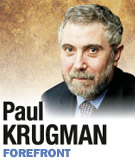Subscriber Benefit
As a subscriber you can listen to articles at work, in the car, or while you work out. Subscribe Now
 As expected, Rick Perry, the governor of Texas, has announced that he is running for president. And we already know what his campaign will be about: faith in miracles.
As expected, Rick Perry, the governor of Texas, has announced that he is running for president. And we already know what his campaign will be about: faith in miracles.
Some of these miracles will involve things that you’re liable to read in the Bible. But if he wins the Republican nomination, his campaign will probably center on a more secular theme: the alleged economic miracle in Texas, which, it’s often asserted, sailed through the Great Recession almost unscathed thanks to conservative economic policies. And Perry will claim that he can restore prosperity to America by applying the same policies at a national level.
So what you need to know is that the Texas miracle is a myth, and more broadly that Texan experience offers no useful lessons on how to restore national full employment.
It’s true that Texas entered recession a bit later than the rest of America, mainly because the state’s still energy-heavy economy was buoyed by high oil prices through the first half of 2008. Also, Texas was spared the worst of the housing crisis, partly because it turns out to have surprisingly strict regulation of mortgage lending.
Despite all that, however, from mid-2008 onward unemployment soared in Texas, just as it did almost everywhere else.
In June 2011, the Texas unemployment rate was 8.2 percent. That was less than unemployment in collapsed-bubble states like California and Florida, but it was slightly higher than the unemployment rate in New York, and significantly higher than the rate in Massachusetts.
So where does the notion of a Texas miracle come from? Mainly from widespread misunderstanding of the economic effects of population growth.
Texas has, for many decades, had much faster population growth than the rest of America—about twice as fast since 1990. Several factors underlie this rapid population growth: a high birth rate, immigration from Mexico, and inward migration of Americans from other states, who are attracted to Texas by its warm weather and low cost of living, low housing costs in particular.
And just to be clear, there’s nothing wrong with a low cost of living. In particular, there’s a good case to be made that zoning policies in many states unnecessarily restrict the supply of housing, and that this is one area where Texas does in fact do something right.
But what does population growth have to do with job growth? A couple of channels. Many of the people moving to Texas—retirees in search of warm winters, middle-class Mexicans in search of a safer life—bring purchasing power that leads to greater local employment.
So Texas tends, in good years and bad, to have higher job growth than the rest of America. But it needs lots of new jobs just to keep up with its rising population—and as those unemployment comparisons show, recent employment growth has fallen well short of what’s needed.
If this picture doesn’t look very much like the glowing portrait Texas boosters like to paint, there’s a reason: The glowing portrait is false.
What Texas shows is that a state offering cheap labor and, less important, weak regulation can attract jobs from other states. The point is that arguing from this experience that depressing wages and dismantling regulation in America as a whole would create more jobs involves a fallacy of composition: Every state can’t lure jobs away from every other state.
In fact, at a national level lower wages would almost certainly lead to fewer jobs—because they would leave working Americans even less able to cope with the overhang of debt left behind by the housing bubble, an overhang that is at the heart of our economic problem.
So when Perry presents himself as the candidate who knows how to create jobs, don’t believe him. His prescriptions for job creation would work about as well in practice as his prayer-based attempt to end Texas’ crippling drought.•
__________
Krugman is a New York Times columnist. Send comments on this column to [email protected].
Please enable JavaScript to view this content.
